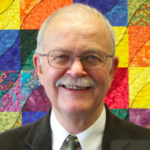
I took this picture of a Minneapolis lake on a windy day in early February. The lake’s name in the Dakota language is Bde Maka Ska, which is translated into English as “White Earth Lake”, a name especially appropriate for early February when the lake is frozen and snow covered. On the day I took this photo the temperature was hovering around zero, and my hands started to numb as soon as I took off my gloves to use my phone’s camera.
The thing is, in a few months I could stand in the same spot and take a totally different picture of the lake. Not only will the snow be gone and the ice out, but the lake shore will be crowded with people -walkers and joggers, skaters and bikers – all eager to take advantage of a chance to be outside and to warm up after a long winter. Of course this spring these people will be wearing masks and seeking to distance from one another, but they will be there.
The lake itself will also be alive with people – people canoeing, sailing, kayaking, and windsurfing. I especially enjoy watching the windsurfers, who fly over the lake on their surfboards powered by a small sail. Off they go then suddenly something happens with the wind or waves, and they’re under water. But they pop right back up, wrestle their surfboards upright, fluff up their sails, and take off again. It’s a lesson in resilience just to watch them.
But now it’s still winter, a very different picture of the lake. The bleakness of a Minnesota winter, the desolation of it all, reminds me of the depths of mental illness, a time when life hurts and hope is frozen. Mental illness feels like February in Minnesota. Even worse, it feels like it’s always going to be February in Minnesota.
Mental illness says it’s always going to be awful, hope is an illusion, and spring is a myth. Please don’t listen. Mental illness is lying to you. The truth is that winter doesn’t last forever, and life will get better. Maybe not tomorrow, but things will change. Hope isn’t frozen; it just needs some time to thaw out. Recovery is as real as mental illness.
I am involved with Vail Place Uptown, a clubhouse in Minneapolis for people living with mental illness. We know that recovery is possible because it’s happening for us. As we become valued community members of the community and joy returns to our lives, we find more and more reasons to get up in the morning.
No, recovery doesn’t mean that we will receive back all that mental illness has taken away. Yes, recovery does mean that life can once again be full and good, that we can feel valued and know that we are making a contribution. We may even find a better life than we have ever known before. There are many reasons for hope. Just ask the members at Vail Place.
My experience of recovery is inseparable from my life of faith, a life renewed each year in the Lenten journey from the utterly bleak to the profoundly joyous. We come to the cross, to Good Friday and that moment when even Jesus felt forsaken and hope had no place. But it is just a moment; the journey isn’t over. Easter follows Good Friday, and hope returns in ways none of us could have imagined. The recovery journey to new life is enfolded and nourished by the Easter journey to resurrection.
Spring comes to Minnesota by fits and starts. Just after you’ve put your heavy coat in the back of the closet it snows again. Nevertheless, I know that one morning – I’d bet around Easter this year – I’ll go to Lake Bde Maka Ska and the ice will be out and the people will be back. Spring has come.

Bob Griggs
Ordained in 1973, Bob Griggs has served UCC churches in Massachusetts, New Hampshire, and Minnesota. He is an Advisory Council member at Vail Place, a club house for people living with mental illness. He is also the author of A Pelican of the Wilderness: Depression, Psalms, Ministry, and Movies and Recovering from Depression: Forty-Nine Helps.